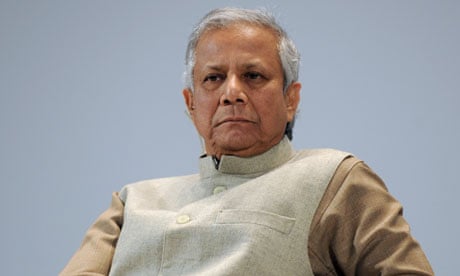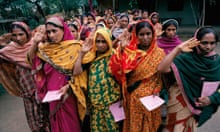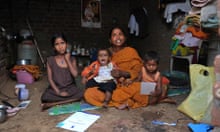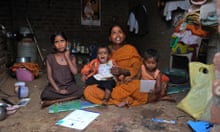Muhammad Yunus, the Nobel prizewinning economist and so-called father of microfinance, faces being ousted from the bank that he founded to help poor people in Bangladesh and across the developing world.
Yunus, the managing director of the Grameen Bank, which has lent small sums to millions of deprived people to help them start or run their own businesses as a first step out of poverty since being created in 1983, has been caught in a bitter political battle in his homeland of Bangladesh.
The campaign to remove Yunus, mounted mainly by politicians, is to intensify this week ahead of a key board meeting next Monday, which his supporters believe will involve an attempt to force the 70-year-old to quit as managing director.
Last week, Bangladesh's finance minister said Yunus should stand down following alleged irregularities in operations.
Abul Maal Abdul Muhith called Yunus a "man of high standing and respect" but "now old". The minister, who is 77, said: "We need to redefine the bank's role and bring it under closer regulation."
Supporters of Yunus fear politicians want to bring Grameen under government control. Yunus did not respond directly to the minister's comments but told reporters: "Any transition [would] essentially require a friendly environment and support from the inside and outside stakeholders of the bank to ensure that we continue to be totally committed to our mission for and with the poor."
Other government comments have been less polite. In December, the prime minister, Sheikh Hasina, accused Yunus of treating Grameen as his personal property and claimed the group was "sucking blood from the poor".
Supporters have branded the claim as grotesque, especially as Yunus has won a Nobel prize for his work on reducing poverty.
He has appeared in a Dhaka court to face charges that one of his social business ventures resulted in the sale of contaminated yoghurt.
He has also had to answer claims made in a Norwegian television documentary last year that Grameen transferred funds from Norway's aid agency in the 1990s from one legal entity to another for tax purposes. The Norwegian government said an inquiry had found no evidence of wrongdoing.
The attacks on Yunus come at a time when microlending – once hailed as a model that would change the lives of hundreds of millions in the developing roads – faces increasing political hostility.
In India, politicians have accused bankers of profiteering from the poor and, in some places, banned further lending or recovery of debts.
In the southern Indian state of Andhra Pradesh, aggressive selling by scores of unregulated microfinance firms has pushed huge numbers of already desperately poor farmers deeply into debt. Some analysts have spoken of the industry as south Asia's equivalent of American's subprime loans, with equal potential to cause financial havoc.
Friends and admirers of Yunus believe politicians have been looking for an opportunity to oust him since the economist tried to establish a political party several years ago to fight corruption, an endemic problem in Bangladesh.
Another motive may be the electoral advantages in controlling the bank itself, in which the government has a 10% stake, and the resources and popularity it might bring.
The bank helps about 8m of Bangladesh's poorest families and, through social business partnerships with global brands such as Adidas and Danone, has secured employment for more than 30,000 people.
An international campaign to defend Yunus has been launched. The high-powered Friends of Grameen, chaired by Mary Robinson, the former United Nations high commissioner for human rights and one-time president of Ireland, condemned "the campaign of misinformation" against Yunus in a statement last week. It said the "increasingly aggressive attacks" on Yunus were "politically orchestrated".
Other members include James Wolfensohn, the former World Bank president, Yeardley Smith, the French-born American actor, and Liam Black, a UK-based social entrepreneur.
"It is vital that Grameen Bank remains an independent financial resource for the poor of rural Bangladesh," Black said. "The bullying and insulting of Yunus as a 'blood sucker' and the pathetic attempts by the government to remove him on grounds of his age must stop."
How Grameen Bank was formed
The idea of microfinance came to Muhammad Yunus when, as a young economics professor during a famine in Bangladesh in the late 1970s, he came across rural women skilled in local handicrafts who owed so much to local moneylenders that they earned only pennies each day from hours of labour.
Yunus created a bank that would lend small sums to such clients, filling the gap that traditional banks had left and cutting out local loan sharks. The model of small sums lent mainly to women, often organised into mutually supporting groups, was extremely successful, with very few loans left un-repaid and a wide range of social benefits.
The bank rapidly had millions of clients. The model of Grameen Bank – Grameen means rural or grassroots in the Bengali language – has been exported over much of the developing world. In recent years however newcomers to the business have made significant profits from microfinance. Some have been accused of exploiting the poor through aggressive selling techniques, high interest rates and aggressive collection of loan repayments.



